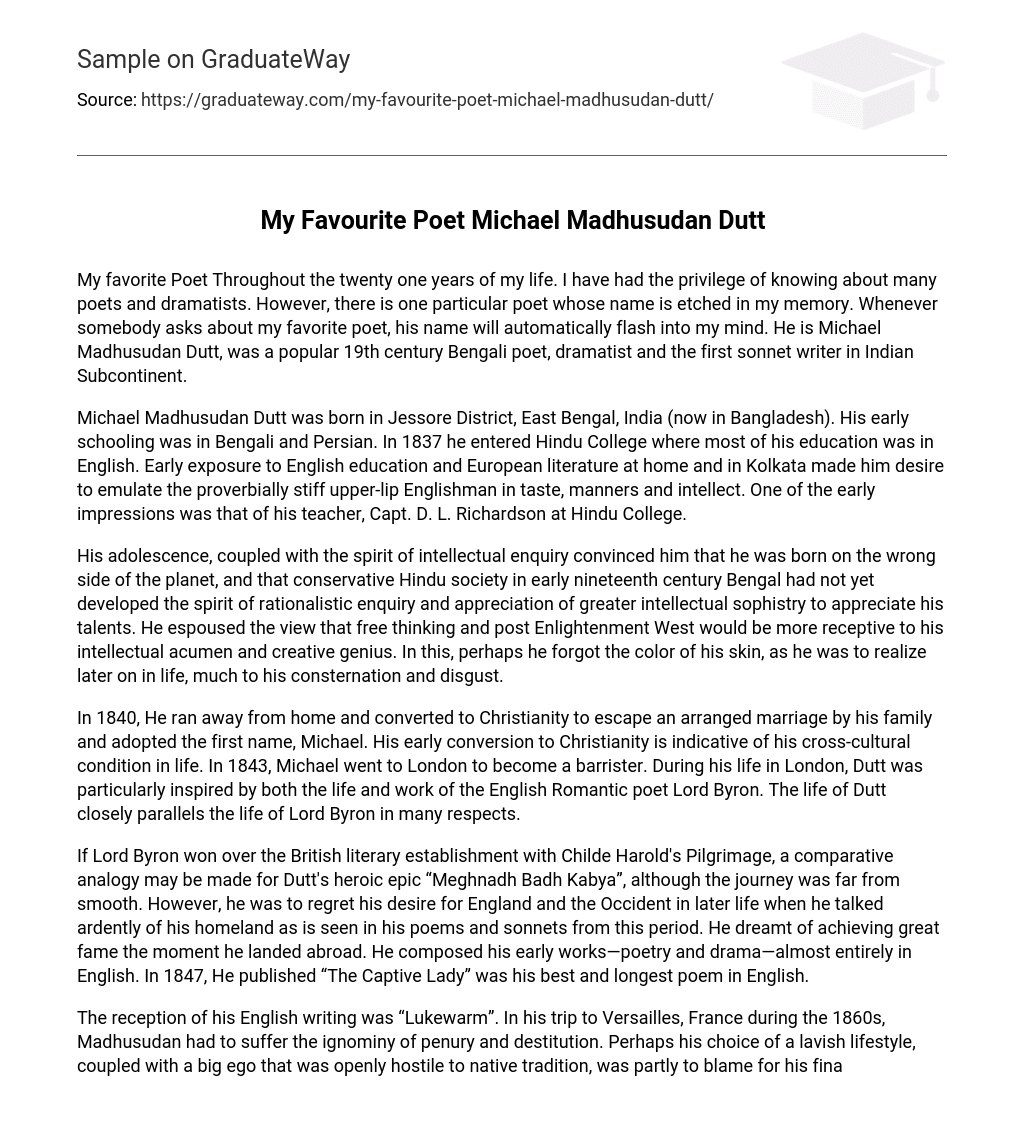My favorite Poet Throughout the twenty one years of my life. I have had the privilege of knowing about many poets and dramatists. However, there is one particular poet whose name is etched in my memory. Whenever somebody asks about my favorite poet, his name will automatically flash into my mind. He is Michael Madhusudan Dutt, was a popular 19th century Bengali poet, dramatist and the first sonnet writer in Indian Subcontinent.
Michael Madhusudan Dutt was born in Jessore District, East Bengal, India (now in Bangladesh). His early schooling was in Bengali and Persian. In 1837 he entered Hindu College where most of his education was in English. Early exposure to English education and European literature at home and in Kolkata made him desire to emulate the proverbially stiff upper-lip Englishman in taste, manners and intellect. One of the early impressions was that of his teacher, Capt. D. L. Richardson at Hindu College.
His adolescence, coupled with the spirit of intellectual enquiry convinced him that he was born on the wrong side of the planet, and that conservative Hindu society in early nineteenth century Bengal had not yet developed the spirit of rationalistic enquiry and appreciation of greater intellectual sophistry to appreciate his talents. He espoused the view that free thinking and post Enlightenment West would be more receptive to his intellectual acumen and creative genius. In this, perhaps he forgot the color of his skin, as he was to realize later on in life, much to his consternation and disgust.
In 1840, He ran away from home and converted to Christianity to escape an arranged marriage by his family and adopted the first name, Michael. His early conversion to Christianity is indicative of his cross-cultural condition in life. In 1843, Michael went to London to become a barrister. During his life in London, Dutt was particularly inspired by both the life and work of the English Romantic poet Lord Byron. The life of Dutt closely parallels the life of Lord Byron in many respects.
If Lord Byron won over the British literary establishment with Childe Harold’s Pilgrimage, a comparative analogy may be made for Dutt’s heroic epic “Meghnadh Badh Kabya”, although the journey was far from smooth. However, he was to regret his desire for England and the Occident in later life when he talked ardently of his homeland as is seen in his poems and sonnets from this period. He dreamt of achieving great fame the moment he landed abroad. He composed his early works—poetry and drama—almost entirely in English. In 1847, He published “The Captive Lady” was his best and longest poem in English.
The reception of his English writing was “Lukewarm”. In his trip to Versailles, France during the 1860s, Madhusudan had to suffer the ignominy of penury and destitution. Perhaps his choice of a lavish lifestyle, coupled with a big ego that was openly hostile to native tradition, was partly to blame for his financial ruin. Except for a very few well-wishers, he had to remain satisfied with many fair-weather friends. It may be argued, not without some obvious irony that during those days, his life oscillated, as it were, between the Scylla of stark poverty and the Charybdis of innumerable loans.
He was head over heels in debt. As he was not in a position to clear off his debts, he was very often threatened by imprisonment. Dutt was able to return home only due to the munificent generosity of Ishwar Chandra Vidyasagar. For this, Dutt was to regard Vidyasagar as Dayar Sagar (meaning the ocean of kindness) for as long as he lived. Although he had tried to be a famous writer in English Literature but he failed. After coming back to his own country he found his name and fame in his own country and became the first sonnet writer in Bengali Literature.
In 1856 after the death of his father he returned to Calcutta where he began to write Bengali poetry. He remained in Calcutta until 1862 where he married a European woman, Henrietta. His principal Bengali works, written mostly between 1858 and 1862, include a number of dramas written in prose, long narrative poems, and many lyrics. He experimented ceaselessly with diction and verse forms, and it was he who introduced “Amitrakshara” a form of blank verse with varied caesuras, and many other original lyric styles. His most mportant prose drama, “Sharmishtha”, is based on an episode in Sanskrit from the Mahabharata. His first sonnet was “Tilottama-sambhava” a narrative poem on the story of Sunda and Upasunda; “Meghanada-vadha-kabya”, an epic on the Ramayana theme. Madhusudan opened new era in Bengali Literature. Whatever approach or text scholars use to discuss Dutt, most confirm his status as a major Bengali literary figure, and many contemporary critics consider him a genius. His all poems and epics have inspired me to be a real patriotic.





